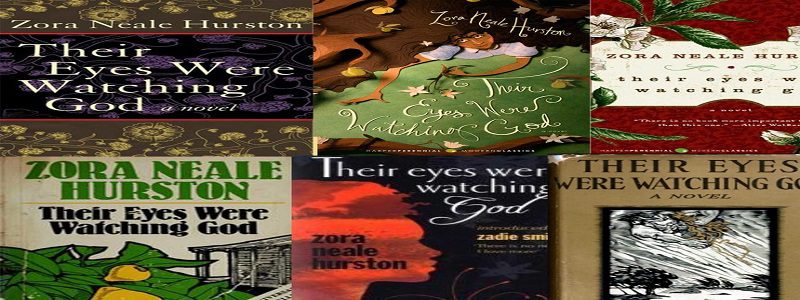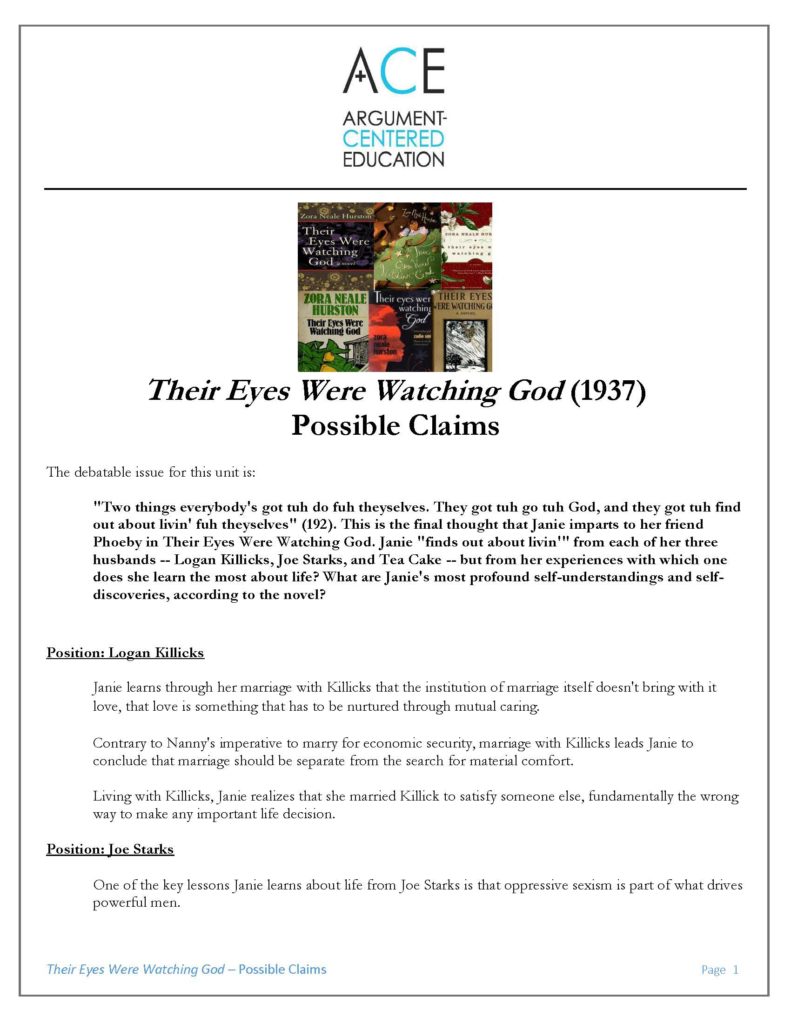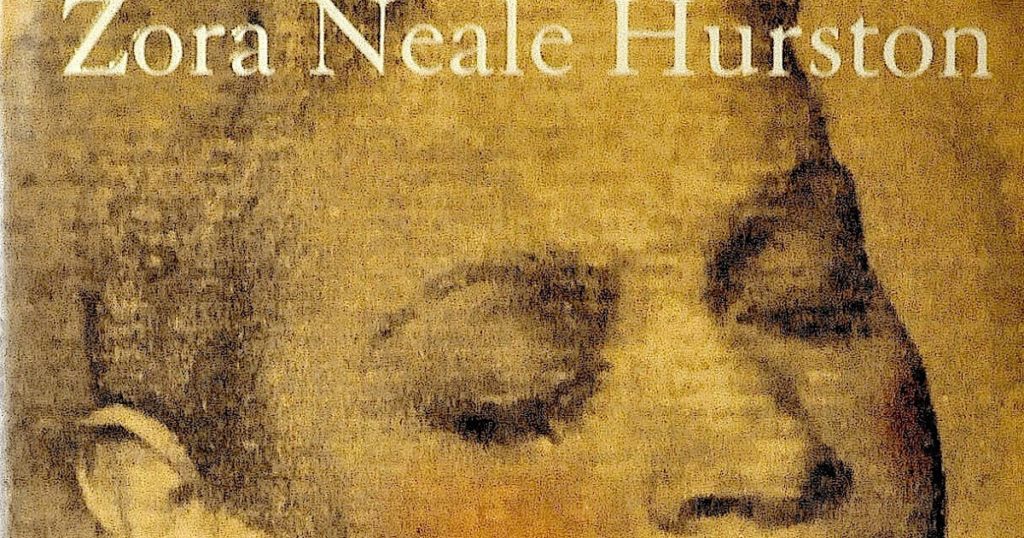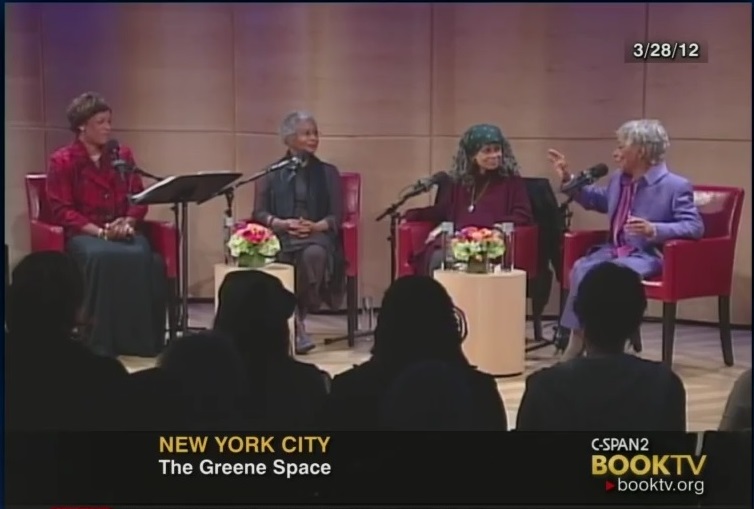
Debating Self-Understanding in ‘Their Eyes Were Watching God’
Zora Neale Hurston’s 1937 masterwork Their Eyes Were Watching God was poorly received in its time. Famed African-American novelist Richard Wright dismissed the novel that year in the October issue of New Masses. “Hurston seems to have no desire whatever to move in the direction of serious fiction . . . . The sensory sweep of her novel carries no theme, no message, no thought.” Their Eyes was found wanting in relation on the sociological criteria of the Racial Uplift movement of the 1930s, but Hurston had her artistic gaze pointed as inwardly as it was immersed in the milieu of the intensely racialized encasing in which her characters lived and her sensibility came to be. Freedom, she wrote, is “something internal . . . . The man himself must make his own emancipation.” Reversing the charge that she turned away from the racist social forces and constructs, she called it “arrogance” to believe that “black lives are only defensive reactions to white actions.”
But time would allow critics and readers to catch up to the brilliance of Hurston’s greatest novel. They were aided by novelist Alice Walker’s 1975 article for Ms. magazine, “Looking for Zora,” which guided African-American Studies university departments — most notably Henry Louis Gates’s at Harvard — to carefully read and re-read Their Eyes. Feminist critics embraced Zora Neale’s work, as well. By the early 2000’s, Oprah Winfrey jet-fueled its sales with a Book-of-the-Month Club seal and the blurb, “It is my favorite love story of all time.” Time called it one of the 100 best English-language novels since 1923. Canonization had come, if belatedly, to Their Eyes Were Watching God. Richly deserved, for its piercing honesty and psychological insight about the profound coupling of love and emancipation, its remarkable deftness with racial dominance and intimidation in the Jim Crow south, and its anthropological canniness and rigor in its observation and recording of small-town southern black life in the first third of 20th century America.
For all of its achievement and eventual recognition, however, Their Eyes remains a novel under-studied and under-assigned in English class at the secondary level. It is a challenging work for 11th and 12th graders, but one whose challenges amply reward students who strive to answer them. I recently began working with a partner high school on a Their Eyes unit. Our work on the unit hasn’t reached pear tree like ripeness and fecundity (in one of the novel’s repeated images), but our basic argument-centered strategy on the novel has reached fruition.
The debatable issue I recommend is one on the motif of self-understanding in this coming of age story.
“Two things everybody’s got tuh do fuh theyselves. They got tuh go tuh God, and they got tuh find out about livin’ fuh theyselves” (192). This is the final thought that Janie imparts to her friend Phoeby in Their Eyes Were Watching God. Janie certainly “finds out about livin'” from each of her three husbands (Logan Killicks, Joe Starks, and Tea Cake), but from her experiences with which one does she learn the most about life? Which of her three marriages lead to Janie’s most profound self-understandings and self-discoveries?
Each position taken by students, then, is a version (perhaps even a templatized completion) of: “Though her life is certainly affected in profound ways by all three of her marriages, Janie learns the most about life and living from her experiences with _________________.”
Argumentative claim statements then are what she learns from her experiences with that husband, the self-understanding she earns through her time with him. Evidence comes from instances in the text that foster her deeper apprehension of herself in the world. And reasoning both connects the details of the text to what Janie gleans from the experience, and it contextualizes the evidence by underscoring and emphasizing its thematic significance (i.e., it explains how this particular self-knowledge and life wisdom is important to the novel thematically).
I recommend to teachers that they create a set of possible claims (and, for some units, counter-claims) for each viable position that students can and will be making arguments for. Creating this list of possible claims is a process through which teachers think through the arguments on all sides of the issue, and helps them prepare to teach unit content and skills through argument, and the specific arguments that students may be making and with which they should become familiar. The possible claims list also can be used for modeling or scaffolding purposes, too, during instruction; it is a valuable resource to have in your back pocket.

For the project’s culminating activity, a partner high school chose Table Debates. For this project, the Table Debates take place between three students, with each student defending one of the three positions, advancing two arguments developed from claims like those above. They then respond with one counter-argument each to the other students’ two claims. Then rebuttals are made by each of the three students to the counter-arguments from their two rivals to their two arguments. Then the debates conclude with final evaluative analysis from each student.
The counter-arguments, as is often the case, come in several possible varieties. Here counter-arguments can be of four types. Students can:
(a) Re-interpret the evidence so that it doesn’t actually lead Janie to learn about livin’ what the student claims
(b) Argue that their husband actually teaches Janie this lesson in a more profound, deeper way
(c) Argue that this lesson isn’t actually one that the novel fully embraces thematically, that there are other places in the novel that contradict this lesson, conflicting or mitigating it thematically
(d) Argue that the “thematic lesson” their husband reveals to Janie is more significant or that it subsumes this one in some way.
Though these are the full slate of options, the list here can be simplified for students, of course. One way to do this: limit students to options (a) and (b), or (a) and (c).
Rebuttals are rather universal. They respond to and try to refute — or respond to and partially concede — the counter-arguments on at least one of the original arguments. Rebuttals do not need to try to “extend” both opening arguments; only one is necessary to “win” a debate. That said, fully conceding opposing arguments against an argument can be tricky and is typically a tactic of more rather than less experienced debaters.
One technique I recommend for going back to key passages in the novel and working through their relevance to the arguments that can be made for (and against) each husband being the one to foster Janie’s most profound self-understandings is to play excerpts from African-American actor Ruby Dee’s unabridged reading of the novel, divided by chapter.

The New York City Green Space hosted a panel discussion on Their Eyes Were Watching God, broadcast by C-Span. The panel took place on the 75th anniversary of the publication of the novel, and featured Alice Walker, Ruby Dee, and poet Sonia Sanchez. It’s worth your looking at and possibly pulling out at least a few minutes of excerpts to share with your class in a Their Eyes unit.


